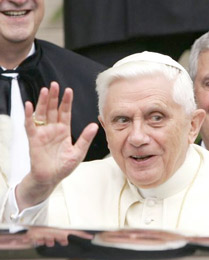Will the Catholics Ever make Up Their Minds?
"Howbeit in vain do they worship me, teaching for doctrines the commandments of men." -Mark 7:7
THE SCOTSMAN | Wed 30 Nov 2005
Pope to abandon idea of unbaptised babies forever in limbo
STEPHEN MCGINTY
 THE
Catholic Church is preparing to abandon the idea of limbo, the theological
belief that children who die before being baptised are suspended in a space
between heaven and hell.
THE
Catholic Church is preparing to abandon the idea of limbo, the theological
belief that children who die before being baptised are suspended in a space
between heaven and hell.
The concept, which was devised in the 13th century and was depicted in numerous works of art during the Renaissance, such as Descent into Limbo by the painter Giotto, and in Dante's masterpiece, the Divine Comedy, is of a metaphysical space where infants are blissfully happy but are not actually in the presence of God.
The idea of limbo was developed as a response to the harshness of early Church teachings which insisted that any child who died before he or she was baptised would still be stained by Original Sin and so would be condemned to hell.
The belief, which is unique to the Catholic Church, has fallen out of favour over the past 50 years. It is rarely mentioned and until recently has been left in its own kind of limbo.
However, an international commission of Catholic theologians, meeting in the Vatican this week, has been pondering the issue and is expected to advise Pope Benedict XVI to announce officially that the theological concept of limbo is incorrect.
Instead, the new belief is expected to be that unbaptised babies will go directly to heaven.
Pope Benedict had already expressed his doubts about limbo when, as Cardinal Joseph Ratzinger, he was head of the Vatican's Congregation for the Doctrine of the Faith, the Church's doctrinal watchdog.
In an interview in 1984, he said: "Limbo has never been a defined truth of faith. Personally, speaking as a theologian and not as head of the Congregation, I would drop something that has always been only a theological hypothesis."
According to Italian Vatican commentators, the reluctance of the theologians to use the word limbo was demonstrated in the way in which the Vatican referred to it in its official statement for this week's meeting. It referred to the week-long conference as a discussion on "the fate of children who die without baptism".
Pope Benedict's predecessor, John Paul II, gave the commission the task of looking at the issue in 2004 and there has always been speculation that he wanted to drop the concept after he wrote his own papal document which gave no clear answer to the question of what happens to children who die before being baptised.
The late pope had written: "The Church can only entrust them to the mercy of God. In fact the great mercy of God, who wants all men to be saved, and the tenderness of Jesus towards children allow us to hope that there is a way of salvation for children who die without baptism."
That view was in contrast to what Pope Pius X had declared in 1905: "Children who die without baptism go into limbo, where they do not enjoy God, but they do not suffer either, because having Original Sin, and only that, they do not deserve paradise, but neither hell or purgatory."
The fate of children who die before baptism has interested Christians since the religion's earliest days.
The idea was first suggested by St Gregory of Nazianzus (329-390 AD), who believed that the unbaptised would neither be punished nor access the full glory of God.
This was dismissed by St Augustine of Hippo (354-430 AD), who insisted instead that baptism was necessary for salvation and that even babies would be consigned to hell if they were not baptised.
He did, however, concede that once in hell their torment would be the mildest of all its residents. This torture of the innocent was unacceptable to St Thomas Aquinas (1226-1274 AD), who was the first major theologian to speculate about the existence of a place called limbo, whose name is derived from the Latin limbus which means "hem" or "edge". There, on the edge of heaven, the unbaptised would exist in a state of what he described as "natural happiness".
Last night, John Haldane, a professor of philosophy at St Andrews University and a consulter to the Vatican's Pontifical Council for Culture, said that the issue of limbo was "something of a medieval curiosity" that no longer preoccupies people. He said that the reason the Catholic Church was clarifying its position was that people still wrongly perceived heaven as a place and not as a state of being.
"The idea of limbo conjures up the image of God as some kind of government bureaucrat who says to people, not just babies, 'Sorry, you don't have your passport stamped with baptism, you'll have to wait over there'.
"Instead, God's powers are such that He can overcome the issue of Original Sin as He chooses, according to special circumstances."
